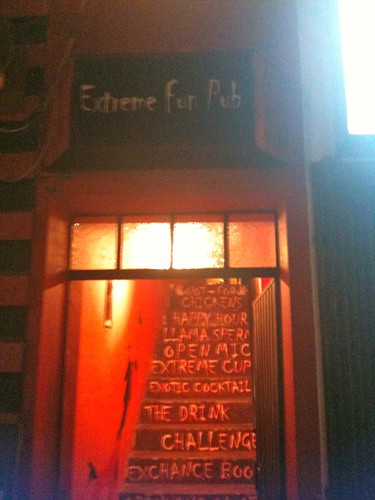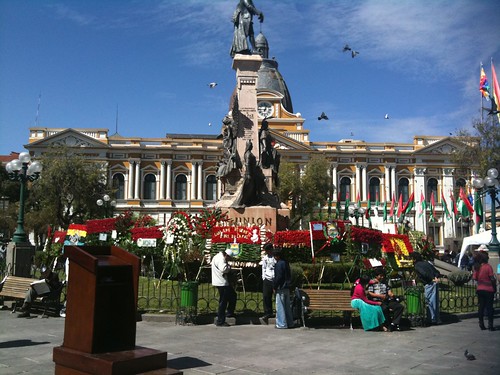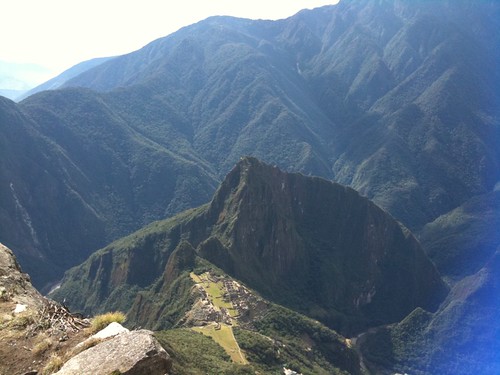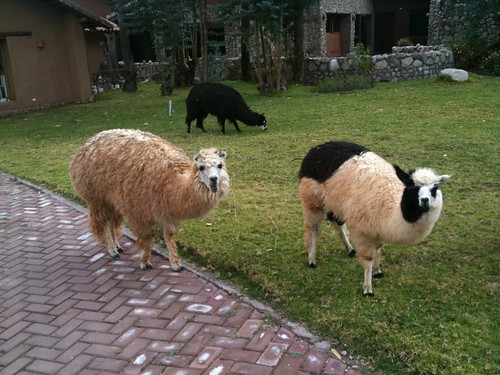Uyuni Salt Flats, Bolivia July 2011.
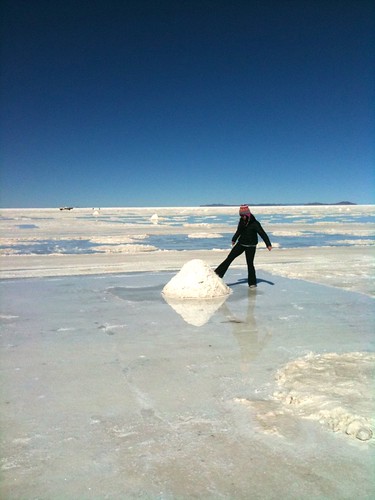
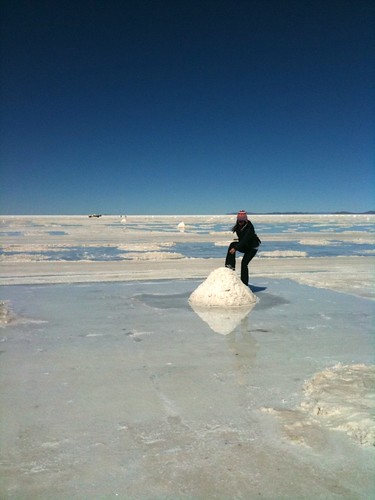
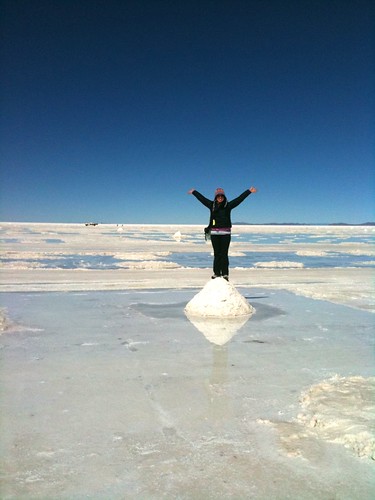



This was a really quick but nerve wracking adventure that happened at the last minute on our tour to Peru and Machu Picchu. Everyone else was going to continue to tour Peru for the next 2 weeks, while I had only 4 and a half days before returning to Lima for a day and then home. When we were wandering around Cusco one afternoon, I spotted a tour operator that offered short trips to Bolivia for a reasonable price. There are many many competing tour operators in the Cusco area; it seems as if the entire town's economy was redesigned to support tourists.
While it might seem strange to want to visit Bolivia for only 4 days, and not stick around Cusco, Peru, it actually made a lot of sense to me. I was curious about Bolivia, the one country which has strained relations with the USA, a relatively closed economy and apparently the lowest living standard in all of Latin America. How did it contrast with Peru? What were the differences? Were they apparent on the surface as Bloomberg economists report?
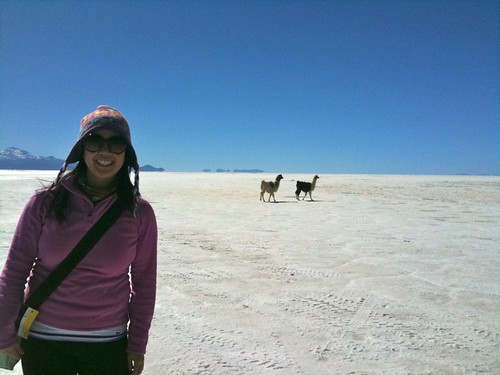 |
| Uyuni Sal Flats, Bolivia |
These were all the questions I had in mind, as well as a strong desire to see the Uyuni Salt Flats which take the most amazing photos.
I flew from Cusco to La Paz on a short flight. Then I was transferred to a bus that drove to Uyuni overnight. This bus was terribly cold and bumpy. There were few shock absorbers and no heating so, even though we had blankets it was extremely uncomfortable and a bit frightening. Drivers here will do a long haul shift, straight through the middle of the night and occasionally one might feel a lurch and a swivel, in the double decker bus. Sometimes it would feel as if the bus was ready to tip on its side. I did not want to look outside to see what the road conditions were like, but no matter; it was so cold the frost caked itself up on the glass and obscured the entire view.
I had brought my laptop with me on this trip and was a bit worried that the intense vibration from over 16 hrs of overnight bus would damage it, but it was a new macbook air and survived nicely. Hooray for solid state, as a laptop would never have survived such a trip years ago. :)
I had brought my laptop with me on this trip and was a bit worried that the intense vibration from over 16 hrs of overnight bus would damage it, but it was a new macbook air and survived nicely. Hooray for solid state, as a laptop would never have survived such a trip years ago. :)
 |
| Downtown La Paz |
I saw early dawn and morning in Uyuni, where I was transferred to a jeep tour of the flats. The flats are amazingly beautiful! and the water makes the salt look like a mirror. Although the driver spoke only spanish, a few friendly tourists in the jeep kindly translated for me. We visited a giant cactus island in the middle of the salt flats as well as tiny town that made salt sculptures and sold souvenirs.
In the evening I explored Uyuni, which is a small dusty town with a few pubs here, such as the Extreme Fun Pub and good local fare. The return bus trip was not as bad, as the weather had warmed up a bit. I arrived early in the AM in La Paz. We arrived at an ungodly hour of 4 am. From there I caught a cab to the hostel and we had to knock several times to get someone to open up and let us in.
La Paz is a really interesting city, with a lot of character. Guidebooks will tell you that the city is one of the highest elevations in the world at nearly 10,000 feet. What I struck me was the city was in the shape of bowl, with the city center at the bottom of the bowl. There was a nice sense of layering on the drive into the city from the airport, because as you drove into La Paz, one would descend gradually, gradually until you reach the main streets.
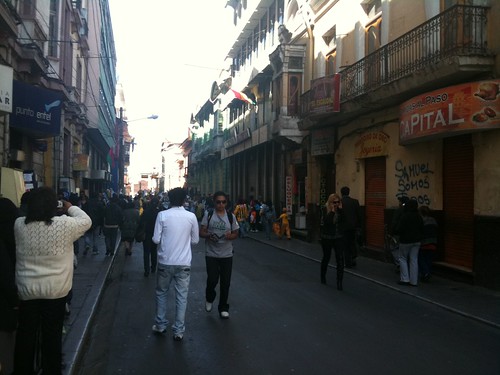 |
| A street in La Paz |
While I was only able to spend a little time wandering around for a day, I got a nice sense of the place. There are no large american companies visible anywhere. None of the US companies that had a strong presence in Peru appeared anywhere. No Starbucks, no McDonalds, no Kentucky Fried Chicken, no Citibank, nope, nada. Don't hope for it. The banks are owned by the state. The largest fast food chicken restaurant is owned by the state. It was really good chicken with really good mustard sauce, but manufactured and owned by the state. The only imported goods I could find were made in Canada or Brazil, and even shoes are made in Bolivia. Music, however can come from America; Selena Gomez is a big hit and posters of her are everywhere.
While traffic can be bad, there was something to watch: lovely young women entertained the traffic with color guard flag routines and at night fire spinning, sometimes asking for tips, other times, not at all. It seemed as if they were really proud of their skill and that was their motivation above anything else. They were really pretty, with unusually calm looking demeanors, and strong brows.
There was a street market up the hill from the downtown main boulevard that I visited. It was calm, nice, although not the cleanest. Some of the people chanted and sang in the markets. Climbing a hill, and then back down again can be pretty tiring here in La Paz. The altitude here puts a strain on any cardio, just like Cusco. On my way back to the hostel, I came across a street parade. I really wish I had more time to explore the city, there people are very pleasant here.
There was a street market up the hill from the downtown main boulevard that I visited. It was calm, nice, although not the cleanest. Some of the people chanted and sang in the markets. Climbing a hill, and then back down again can be pretty tiring here in La Paz. The altitude here puts a strain on any cardio, just like Cusco. On my way back to the hostel, I came across a street parade. I really wish I had more time to explore the city, there people are very pleasant here.
After a day in La Paz, I flew back to Cusco.
